人教版必修三高中优秀英语教案(完整版)
- 格式:docx
- 大小:122.52 KB
- 文档页数:66

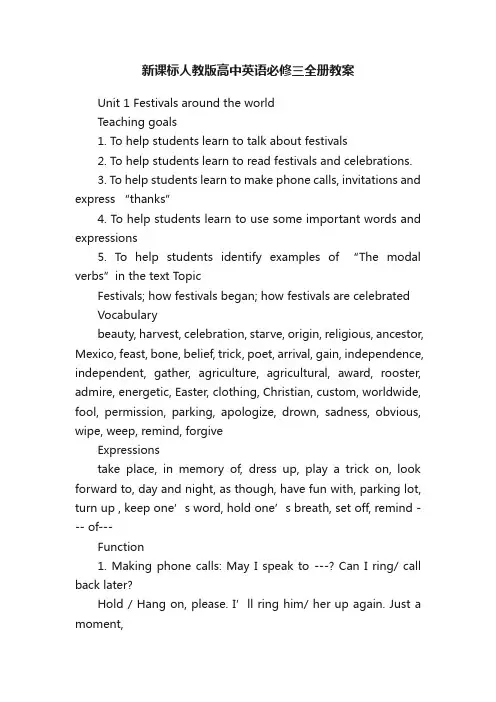
新课标人教版高中英语必修三全册教案Unit 1 Festivals around the worldTeaching goals1. To help students learn to talk about festivals2. To help students learn to read festivals and celebrations.3. To help students learn to make phone calls, invitations and express “thanks”4. To help students learn to use some important words and expressions5. To help students identify examples of “The modal verbs”in the text TopicFestivals; how festivals began; how festivals are celebratedVocabularybeauty, harvest, celebration, starve, origin, religious, ancestor, Mexico, feast, bone, belief, trick, poet, arrival, gain, independence, independent, gather, agriculture, agricultural, award, rooster, admire, energetic, Easter, clothing, Christian, custom, worldwide, fool, permission, parking, apologize, drown, sadness, obvious, wipe, weep, remind, forgiveExpressionstake place, in memory of, dress up, play a trick on, look forward to, day and night, as though, have fun with, parking lot, turn up , keep one’s word, hold one’s breath, set off, remind --- of---Function1. Making phone calls: May I speak to ---? Can I ring/ call back later?Hold / Hang on, please. I’ll ring him/ her up again. Just a moment,please. Sorry, he / she isn’t here right now.2. Invitations: I wonder if you are inerested in--- I’d like to invite you to ---Would you like---? Could/ Would you please ---? I’m looking forwardto--- I’d love to, but----3. Thanks: Thank you so much. Thanks a lot. That’s very kind of you.You’re most welcome. Don’t mention it. It’s a pleasure.GrammarThe modal verbs (can,could, may, might, will, would, shall, should, must, can’t)Teaching AidsMultimedia facilities, tape-recorder, photos, tape-recorder, photos, diagramsPeriod OneProcedureStep1 Warming up⑴Warming up by Brainstorming holidays around the world.⑵Warming up by guessing which picture matches with which festival.⑶Warming up by discussing and listingStudents are required to work in groups and list three more Chinese festivals that they know. Discuss when they take place, what they celebrate and what people do at that time. Then tell the group which festival is his/ her favourite and why.Step 2 Pre-readingDiscussing and answeringAsk students to discuss and answer the two questions on P11) It is intended to help students bring their personalexperience into the discussion of festivals.2) Students are directed to predict the content of the reading passage, based on the title and pictures.Step 3 Reading1.SkimmingAsk students to read the Ex1 on P3, have them understand four kinds of festivals, and then ask them to skim the reading passage. After reading, ask the whole class to fill the first line of the chart together. Then get them to finish the chart by themselves. At last, have three students tell the class his/ her answers.2. Scanning for the detailed information1) Ask students to Scan the passage and finish the true and false exercise.1. The ancient people needn’t worry about their food. F2. Halloween used to be a festival intended to honour the dead. T3. Qu Yuan was a great poet who people honour a lot in China. T4. Mid-autumn Festival is held to celebrate the end of autumn. F5. Easter celebrates the birth of Jesus. F2)Ask students to scan the passage again to find out the answers to the first three questions of the Ex2 on P3. And then ask one student to answer the questions and check with the whole class.Suggested answers:1.Festivals of the dead are for honouring or satisfying dead ancesters ancestors or others, who some people believe might return to help or harm living people.2.Auturn festivals are happy events because people are thankful that food is ready for winter and the hard farm work is finished.3. At spring festivals, people usually have dances, carnivals and other activities to celebrate the end of winter and the coming of spring.3. Discussion (group work)Ask students to discuss Question 4 and 5 in Ex2 on P3.Question 4Question 5The similarities:① The Chinese, Japanes e and Mexican festivals of the dead all have customs to honour the dead.② The Chinese and Japanese go to clean their ancestors ’ graves, and the Mexicans offer food, flowers and gifts to the dead.The Difference:The Mexicans eat special food that looks like bones, something the Chinese and Japanese do not do.Step 4. Post reading1. Summarize and fill in the chartAncient Festivals why the end of the cold winter;planting in spring and harvest in autumnhow light fire and make musicFestivals of the dead why to honour the dead or satisfy and please the ancestorshow light lamps, play music, eat food in the shapes ofskulls and cakes with bones, go to their neighbors to askfor sweets,dress upReasons to festivals and celebrations enjoy lifeforget our work for a little while --- ---- Be proud of ourcustoms ------Festivals to honour people why for their great contributions to the societyor thecountryhow Dragon boat racing, eat zongziHarvest Festivalswhy Food is gathered for the winter. A season of agricultural work is over.how decorate churches and town halls, get together to have big meals, admire the moon and eat mooncakesSpring Festivalswhy celebrate the end of winter and the coming of springhow eat delicious food; have exciting carnivals2. Ex4 on P3Have students discuss in pairs which kinds of festival they think are the most important and which are the most fun.Period Two & Period ThreeLanguage focus1.be meant to : 应该, 得要,必须, 应做You are meant to leave a tip. 你得留下小费。
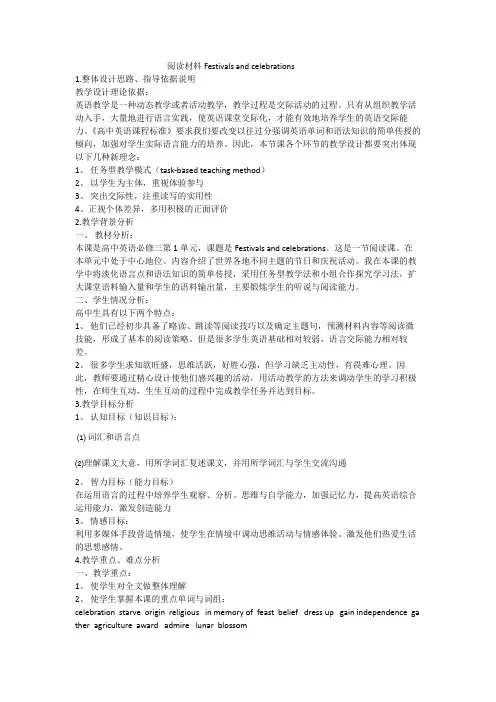
阅读材料Festivals and celebrations1.整体设计思路、指导依据说明教学设计理论依据:英语教学是一种动态教学或者活动教学,教学过程是交际活动的过程。
只有从组织教学活动入手,大量地进行语言实践,使英语课堂交际化,才能有效地培养学生的英语交际能力。
《高中英语课程标准》要求我们要改变以往过分强调英语单词和语法知识的简单传授的倾向,加强对学生实际语言能力的培养。
因此,本节课各个环节的教学设计都要突出体现以下几种新理念:1、任务型教学模式(task-based teaching method)2、以学生为主体,重视体验参与3、突出交际性,注重读写的实用性4、正视个体差异,多用积极的正面评价2.教学背景分析一、教材分析:本课是高中英语必修三第1单元,课题是Festivals and celebrations。
这是一节阅读课。
在本单元中处于中心地位。
内容介绍了世界各地不同主题的节日和庆祝活动。
我在本课的教学中将淡化语言点和语法知识的简单传授,采用任务型教学法和小组合作探究学习法,扩大课堂语料输入量和学生的语料输出量,主要锻炼学生的听说与阅读能力。
二、学生情况分析:高中生具有以下两个特点:1、他们已经初步具备了略读、跳读等阅读技巧以及确定主题句,预测材料内容等阅读微技能,形成了基本的阅读策略。
但是很多学生英语基础相对较弱,语言交际能力相对较差。
2、很多学生求知欲旺盛,思维活跃,好胜心强,但学习缺乏主动性,有畏难心理。
因此,教师要通过精心设计使他们感兴趣的活动,用活动教学的方法来调动学生的学习积极性,在师生互动,生生互动的过程中完成教学任务并达到目标。
3.教学目标分析1、认知目标(知识目标):⑴词汇和语言点⑵理解课文大意,用所学词汇复述课文,并用所学词汇与学生交流沟通2、智力目标(能力目标)在运用语言的过程中培养学生观察、分析、思维与自学能力,加强记忆力,提高英语综合运用能力,激发创造能力3、情感目标:利用多媒体手段营造情境,使学生在情境中调动思维活动与情感体验。
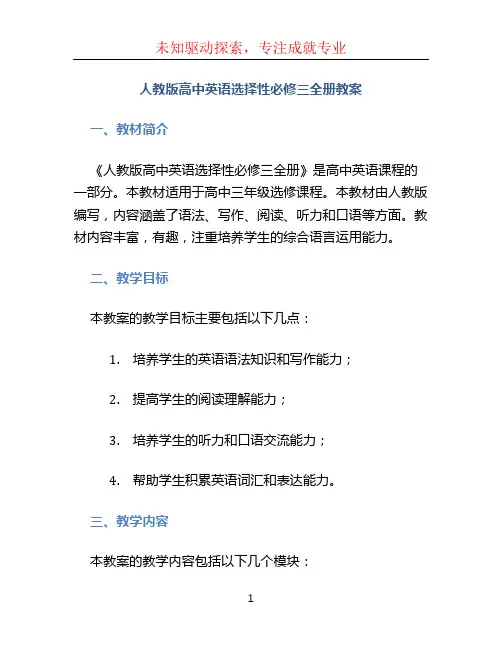
人教版高中英语选择性必修三全册教案一、教材简介《人教版高中英语选择性必修三全册》是高中英语课程的一部分。
本教材适用于高中三年级选修课程。
本教材由人教版编写,内容涵盖了语法、写作、阅读、听力和口语等方面。
教材内容丰富,有趣,注重培养学生的综合语言运用能力。
二、教学目标本教案的教学目标主要包括以下几点:1.培养学生的英语语法知识和写作能力;2.提高学生的阅读理解能力;3.培养学生的听力和口语交流能力;4.帮助学生积累英语词汇和表达能力。
三、教学内容本教案的教学内容包括以下几个模块:1. 语法本模块主要包括以下几个知识点:•动词时态和语态•名词性从句•宾语从句•定语从句2. 写作本模块主要包括以下几个写作任务:•以某一主题为背景写一篇读后感•写一篇对某一事件的评论•写一篇简要说明某一原理或现象3. 阅读本模块主要包括以下几个阅读理解任务:•阅读一篇短文并回答相关问题•阅读一篇长文并总结并归纳文章的主要观点•阅读一篇对某一问题的分析,并写一篇观点陈述4. 听力本模块主要包括以下几个听力任务:•听一段对话并回答相关问题•听一段独白并回答相关问题•听一篇短文并完成相关填空任务5. 口语本模块主要包括以下几个口语任务:•情景对话练习•辩论练习•随机话题演讲四、教学方法为了达到教学目标,本教案将采用以下教学方法:1.教师讲授法:教师通过讲解语法知识点、写作要点、阅读技巧和听力技巧等内容,引导学生掌握相关知识和技能。
2.组织讨论:教师组织学生分组讨论,让学生在小组内交流和讨论教材内容,提高学生的口语表达能力。
3.实践活动:教师组织学生进行实践活动,如写作练习、口语演练和阅读小组讨论等,提高学生的综合语言运用能力。
4.自主学习:教师鼓励学生自主学习,通过阅读、听力和写作等活动,拓展学生的英语知识和能力。
五、教学评估为了评估学生的学习效果,本教案将采用以下评估方法:1.课堂小测:教师每节课后进行课堂小测,检验学生对当堂课的理解程度。
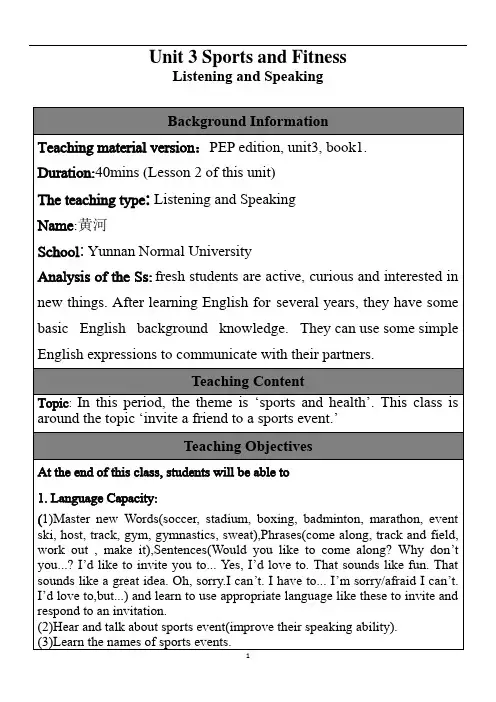
Unit 3 Sports and Fitness Listening and SpeakingStep1 warm-up (5mins) 1.Play a game:pass soccer oneby one. When monitor say‘stop’, one with soccer in handshould answer my questions(Doit twice): Look at the picture andanswer questions:①What is shedoing? ②What sports andexercise do you like?③What doyou think sports and exercisecan do for you?2.Ask Ss to translate thesentence from Pierre deCoubertin. 3.Let Ss know theirleaning objectives1.Animate atmosphere andlet students focus onstudying.2.Develop their individualthinking ability.3.Training their translationability.Step2Pre--listening (7mins) 1.Lead Ss reading the content inthe posters. In this process,Iwill lead them reading the newwords and the words that willappear in the audio.2. Group discussion. I will askSs to discuss the followingquestions: ‘What sports orevents do you like to watch?Which sport would you like totry?3. I will give them the listeningtips:①catch the key word ormain idea.②Do not try toremember or translate eachword.Introduce the topic of sportsevents with postersadvertising them,along withrelated vocabulary andgrammar.This part is inorder to make preparationfor the listening andspeaking and help themlistening smoothly.Step3while- Listening(16mins) 1.I will lead them reading thequestion and let themunderstand what they should doin this part. Besides the questionin book, I will add anothertwo :(1) What is E-sports? (2)Why can't Amy join them?Then,play the audio1. After that check1.Try to develop their habitof reading questions.2.This part is mainly inorder to train students'listening ability: get mainidea, get details andmaking calculation frominformation heard.the answer with Ss.2.Lead Ss listening the conversation 1 again and they are required to circle the words that the speaker stresses. After that let them exchange the answers with their partners and then check the answers with Ss.3. Ask Ss to listen to conversation2 and answer the following questions:(1) When will the event happen? The event will happen___________________.(2) What's a "Blue Paint" run?A "Blue Paint" run is a fun run that______________________.(3)Why is it called a "Blue Paint" run?Because people can buy water balloons filled with __________ and __________ the runners. (4) If 200 people take part in the run and 400 balloons are sold, how much money will they collect?___________________. After that ,they should exchange their answers with partners.Then , I will play audio again and check the answers with Ss.4.Let them Listen to conversation 1 and 2 again and write down the sentences and phrases uesd to make an invitation and accept or refuse an invitation.5.I will give them some sentences and phrases uesd to 3.Adding questions can be beneficial for them to master the listening passage.4.Practise listening for emphasis and stress, to highlight the key words and important information that the speaker wants to emphasis in a conversation 4.Write down the sentences and phrases from listening materials can be beneficial for training them to get useful information.5.Make preparation for their later speaking exercise.。
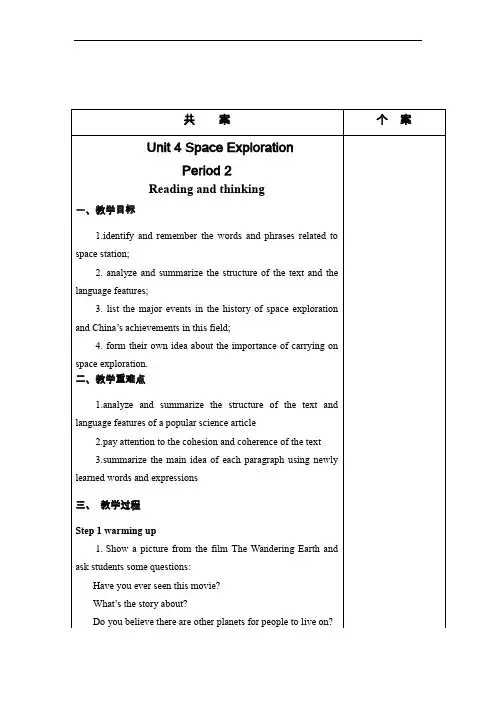
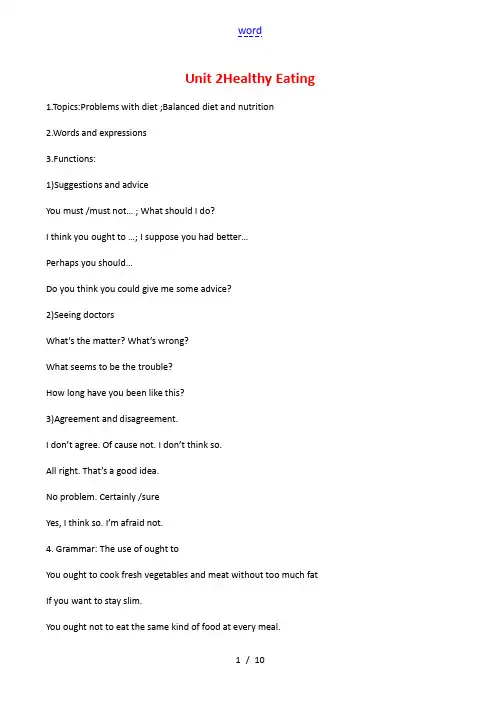
Unit 2Healthy Eating1.Topics:Problems with diet ;Balanced diet and nutrition2.Words and expressions3.Functions:1)Suggestions and adviceYou must /must not… ; What should I do?I think you ought to …; I suppose you had better…Perhaps you should…Do you think you could give me some advice?2)Seeing doctorsWhat’s the matter? What’s wrong?What seems to be the trouble?How long have you been like this?3)Agreement and disagreement.I don’t agree. Of cause not. I don’t think so.All right. T hat’s a good idea.No problem. Certainly /sureYes, I think so. I’m afraid not.4. Grammar: The use of ought toYou ought to cook fresh vegetables and meat without too much fat If you want to stay slim.You ought not to eat the same kind of food at every meal.Period 1.Step 1. warming up1. Do you eat a healthy diet? What kind of food do you usually have for meals? Are the food you usually eat healthy food or unhealthy food?(Discuss in pairs)2. Name some healthy food and unhealthy food.healthy food unhealthy food.All vegetables: cabbages, Fatty food: French friesPeppers tomatoes potatoes cream roast pork/lambAll fruits: apples, grapes sugary food:chocolateStrawberries bananas pears sweets/honey ice-creamDairy products:Milk cheese salty food:can biscuitSeafood: shrimp cookiesTofu eggs3. Do you know that the food you eat helps you grow in different ways? Some will make you fat/tall/thin.Look at the charm below,and see which kind of food they.FOOD TO GIVE YOU ENERGY FOOD TO GROW BONESAND MUSCLE Foods that fiber fordigestion and healthFast energy food Slow energy food Body-building food Protective foodsRice sugarNoodles potatoesSpaghetti breadCorn dumplings Butter creamOils ham nutsFried bread stickFried cake/chips Dairy products:Milk cheeseMeat eggs tofuSeafood shrimp All vegetables(eg.beans, Cucumbers,mushrooms,peas, Cabbage,…)all fruit(pears Apples, peaches, oranges,…)Questions:1.Which of these groups of food do you like best?2.Which of them do you eat most often?3.Do you think we should eat each kind of food?3.What will happen if you do not eat a balanced diet?Too much fatty/sugary/salty food will cause many diseases and get too fat.Only protective food will feel weak ,no energy and get too thin.Step 2. Pre-reading1. Discuss the questions in the chart.(Which food contains more…)2. Order the following food from which contains most fat to which contains less.Answer: ice-cream, eggs, chicken, rice, peachesStep 3 Fast reading and answer the following questions1. What does Wang Pengwei’s restaurant serve?2. What about Yong Hui’s restaurant?Step 4 Intensive reading and find the answers to prehending.Period 2 Language pointsStep 1.Lead-in: Listen to the tape to get a better understanding.Step nguage points1.Wang Pengwei sat in his empty restaurant feeling very frustrated.feeling very frustrated 现在分词在句中作伴随状语eg.She sat on the chair reading a newspaper.(表伴随)Walking in the street, she met her old friend. (表时间)Seeing no body at home, she decided to eat outside.(表原因)The child fell, striking his head against the ground. (表结果)2.His restaurant ought to be full of people.Ought to 1) to show a moral duty 表示一种道义上的责任,应该Eg.She ought to look after her child better.You ought to study hard to get a high mark.2)ought to have done 表示本应该…,而却没有…Eg.You ought to have e yesterday.3.He thought of his mutton kebabs, fatty pork cooked in the hottest oil. 过去分词短语作后置定语,表被动。
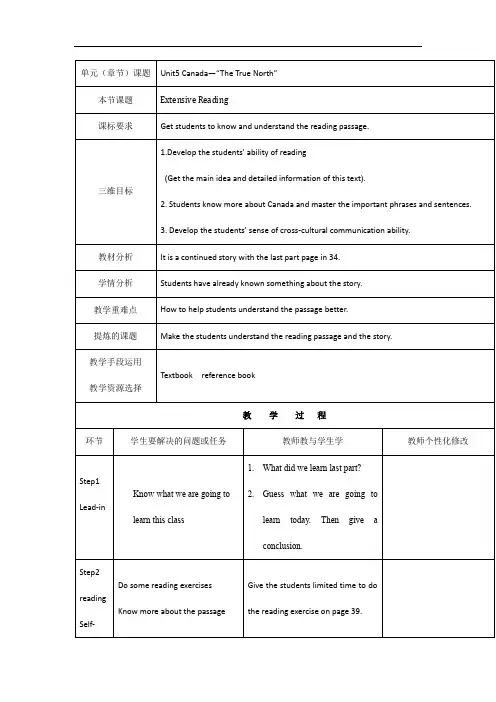
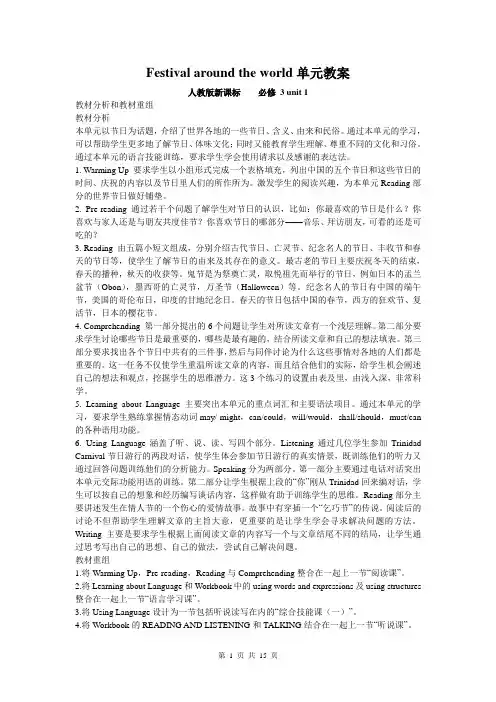
Festival around the world单元教案人教版新课标必修 3 unit 1教材分析和教材重组教材分析本单元以节日为话题,介绍了世界各地的一些节日、含义、由来和民俗。
通过本单元的学习,可以帮助学生更多地了解节日、体味文化;同时又能教育学生理解、尊重不同的文化和习俗。
通过本单元的语言技能训练,要求学生学会使用请求以及感谢的表达法。
1. Warming Up 要求学生以小组形式完成一个表格填充,列出中国的五个节日和这些节日的时间、庆祝的内容以及节日里人们的所作所为。
激发学生的阅读兴趣,为本单元Reading部分的世界节日做好铺垫。
2. Pre-reading 通过若干个问题了解学生对节日的认识,比如:你最喜欢的节日是什么?你喜欢与家人还是与朋友共度佳节?你喜欢节日的哪部分——音乐、拜访朋友,可看的还是可吃的?3. Reading 由五篇小短文组成,分别介绍古代节日、亡灵节、纪念名人的节日、丰收节和春天的节日等,使学生了解节日的由来及其存在的意义。
最古老的节日主要庆祝冬天的结束,春天的播种,秋天的收获等。
鬼节是为祭奠亡灵,取悦祖先而举行的节日,例如日本的盂兰盆节(Obon),墨西哥的亡灵节,万圣节(Halloween)等。
纪念名人的节日有中国的端午节,美国的哥伦布日,印度的甘地纪念日。
春天的节日包括中国的春节,西方的狂欢节、复活节,日本的樱花节。
4. Comprehending 第一部分提出的6个问题让学生对所读文章有一个浅层理解。
第二部分要求学生讨论哪些节日是最重要的,哪些是最有趣的,结合所读文章和自己的想法填表。
第三部分要求找出各个节日中共有的三件事,然后与同伴讨论为什么这些事情对各地的人们都是重要的。
这一任务不仅使学生重温所读文章的内容,而且结合他们的实际,给学生机会阐述自己的想法和观点,挖掘学生的思维潜力。
这3个练习的设置由表及里,由浅入深,非常科学。
5. Learning about Language 主要突出本单元的重点词汇和主要语法项目。
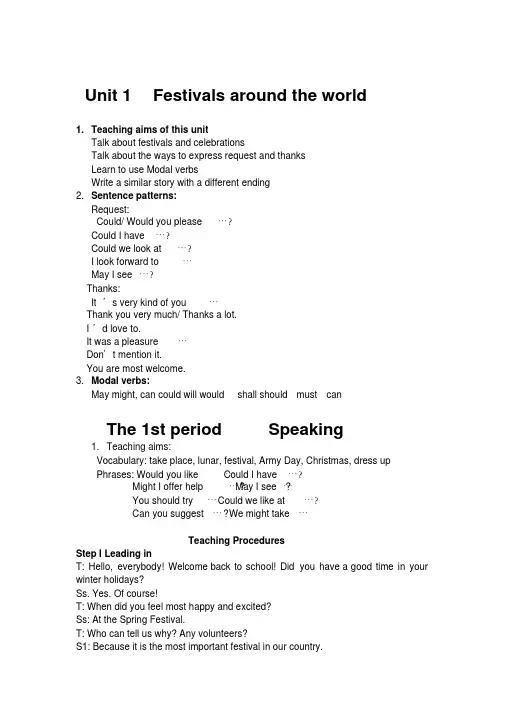
Unit 1 Festivals around the world1.Teaching aims of this unitTalk about festivals and celebrationsTalk about the ways to express request and thanksLearn to use Modal verbsWrite a similar story with a different ending2.Sentence patterns:Request:Could/ Would you please…?Could I have…?Could we look at…?I look forward to…May I see…?Thanks:It’s very kind of you…Thank you very much/ Thanks a lot.I’d love to.It was a pleasure…Don’t mention it.You are most welcome.3.Modal verbs:May might, can could will would shall should must canThe 1st period Speaking1.Teaching aims:Vocabulary: take place, lunar, festival, Army Day, Christmas, dress upPhrases: Would you like … Could I have…?May I see…?Might I offer help…?You should try…Could we like at…?Can you suggest…? W e might take…Teaching ProceduresStep I Leading inT: Hello, everybody! Welcome back to school! Did you have a good time in your winter holidays?Ss. Yes. Of course!T: When did you feel most happy and excited?Ss: At the Spring Festival.T: Who can tell us why? Any volunteers?S1: Because it is the most important festival in our country.S2: Because I got a lot of lucky money from my parents.S3: Because I needn’t study at festivals and there was a lot of delicious food to eat.How great.S4: Because I met my cousins and friends who I hadn’t seen for a long time. T. Very food! I am glad to hear that. Today we will talk about festivals, which are meant to celebrate important events. Please think about some other festivals. Can you name just a few?Ss: New year, Yuan xiao festival…:T: Quite right. That’s called the Lantern’s Festival. How about some other festivals?Ss: The Army Day, International Labour’s Day, National Day, Tomb Sweeping Festival, Dragon Boat Festival, Mid-autumn Day…T: You have done a good job, boys and girls! .Step ⅡWarming –upFestivals are meant to celebrate important events. Different countries have different festivals. Work in groups and lost five Chinese festivals that you know.Discuss when they take place, what they celebrate and one thing that people do at that time. The first one is given to you as an example.Festivals Time of year/date What does itcelebrateWhat do people doMid-Autumn Festival Autumn/Fall The beauty of thefull moon, harvest,time with familyand friendsGive/Eatmooncakes andwatch the fullmoon with familyand friendsStep ⅢPre- readingDiscuss in groups of four1.What’s your favourite holiday of the year? Why?2.What festivals or celebrations do you enjoy in your city or town? Do you likespending festivals with your family or with friends? What part of a festival do you like best---the music, the things to see, the visits or the food?Step ⅣAssignment1.Consolidation2.Listening to the material again after class to be familiar with it.3.Homework: Collect as much information about festivals as possible.The 2nd period ReadingTeaching Aims1.Vocabulary: starve, starvation, plenty, satisfy ancestor lamps lead feast bone originin memory of dress up trick poet arrival national gain independencegather agricultural European custom awards watermelon handsomerooster admire look forward to religious as though have fun with daily2.To enable the students to know the earliest festivals with reasons for them and fourdifferent kinds of festivals that occur in most parts of the world3.To enable the students to master some English expressions and phrases aboutfestivals.4.Teach the basic reading skills: skimming and scanning.5.Try to compare and make conclusion s of different festivals.Step ⅠRevision1.Greetings.2.Review the new words of this part.---festivals3.Check the students’ homeworkStep ⅡReading1.ScanningT: Open your books and turn to page one. I’d like you to do the scanning. Read the text quickly and accurately to get the main idea and answer the 6 questions on Page3.( Ask the student to look through the questions and then read the text silently.)( Four minutes later, check the answers with the whole class. Show the suggestedanswers on the screen.)2.Intensive reading( Allow the students to read aloud and carefully this time to understand the mainideas of each paragraph and the important details)T: Read the text loudly for a second time and them try to tell if these sentences areTrue or False.( F )1. The ancient people needn’t worry about their food.2.Halloween used to be a festival intended to honor the dead. ( T )3.Qu Yuan was a great poet who people honor a lot in China. ( T )4.Mid-autumn Festival is held to celebrate the end ot autumn( F )5.Easter celebrates the birth of Jesus. ( F )3.Reading and discussionT: Read the text a third time and then work impairs to do Exercise 2 on Page 3.( Let the students have enough time to read the passage carefully and discuss the chartwith their partners. Encourage them to expand their answers according to their ownexperiences.)4.Explanation(In this part try to help the students analyse the difficult, long and complexsentences a nd guess the meaning of the new words; ask them to deal with thelanguage points in the context.)T: Now I will discuss some important sentences and phrases in the passage.a.Some festivals are held to honor the dead, or satisfy and please the ancestors,who could return either to help or to do harm.b.In memory ofc.In India there is a national festival on October 2 to honor Mahatma Gandhi,the leader who helped gain In dia’s independence from Britain.d.People are grateful because their food is gathered for the winter, and becausea season of agricultural work is over.e.The most energetic and important festivals are the ones that look forward tothe end of winter and to the coming of spring.f.The country is covered with cherry flowers so that it looks as though it mightbe covered with pink snow.The suggested explanation:a.An attributive clause.The sentence means people hold some festivals either to show respect to thedead or to make their ancestors h appy in case they might come back to doharm.b.in memory of … serving to recall sb, to keep him fresh in people’ minds.He wrote a poem in memory of his dearest wife, who died in an accident.in honor of ( showing great respect or high public regard)in hopes/the hope of (hoping)in defence of (defending)c. a noun phrase followed by an attributive clause as the appositived.two clauses for reasone.energy→energetic adj. ( full of or done with energy)look forward to ( to is a preposition here.)devote to, be/get used to, get down to , stick toe.g. I’m looking forward to hearing from you.Step ⅢListeningT: Now I will play the tape for you. You can just listen with your books closed orlook at your books or read in a low voice together with the tape. It’s up to you. A listening, please write down three things that most festivals seem to have incommon.( Comprehending Ex.3 on Page 3).The 3rd period Learning about languageTeaching aims:1.Let the students know the usage of modal verbs.2.Enable the students to recognize the words and expressions in the reading passageaccording to what mean the same as them.Step ⅠGreeting and Revision( Ask some students to retell the text we learned .)StepⅡ. Practicing the useful words and expressionsT: As we know, there are two important kinds of verbs---transitive verbs and intransitive verbs. But many intransitive verbs have the structure “verb+preposition+objects ” Can you give me some examples?Ss: Sure. Such as look at the picture, hear from my friends, listen to the radio and so on.T: Ok. Now turn to page 4, Ex. 4. You are to make some sentences of your own, using the words given.S1. I’m looking forward to hearing form my friendS2: We are talking about verbs.S3: Would you like to talk with me?S4: Who can think of an effective solution to the problem?S5: Please think about my proposal.Step ⅢUseful StructuresT: Let’s come to the next part. This part is about modal verbs. You are to read the sentences in Ex. 1 and then to find out and write down different sentences with modal verbs form the reading passage a nd try to explain their meanings. If you have any difficulty in understanding them you can refer to Grammar in Pages 92---94Step ⅣSumming up and home workT: Boys and girls, today we have practiced useful words and phrases of this unit and the usage of modal verbs. I think it is not easy for you to master them, after class you should review them.Homework1.Practice of WBP42EX.1,2,3.2.Please find out10 sentences with modal verbs, and try to get their meanings.The 4th period Grammar一、目标与要求1、学习一般现在时态和现在进行时态。
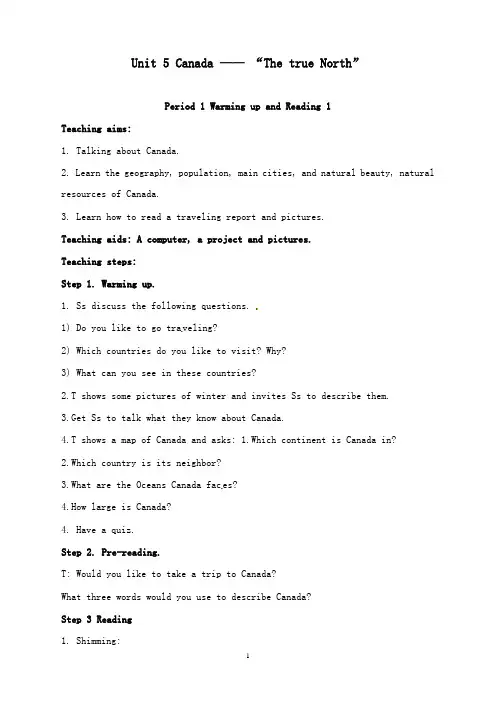
Unit 5 Canada ——“The true North”Period 1 Warming up and Reading 1Teaching aims:1. Talking about Canada.2. Learn the geography, population, main cities, and natural beauty, natural resources of Canada.3. Learn how to read a traveling report and pictures.Teaching aids: A computer, a project and pictures.Teaching steps:Step 1. Warming up.1. Ss discuss the following questions.1) Do you like to go tra veling?2) Which countries do you like to visit? Why?3) What can you see in these countries?2.T shows some pictures of winter and invites Ss to describe them.3.Get Ss to talk what they know about Canada.4.T shows a map of Canada and asks: 1.Which continent is Canada in?2.Which country is its neighbor?3.What are the Oceans Canada fac es?4.How large is Canada?4. Have a quiz.Step 2. Pre-reading.T: Would you like to take a trip to Canada?What three words would you use to describe Canada?Step 3 Reading1. Shimming:Get Ss to read the passage quickly and answer the following questions: 1) What is the passage mainly about?Sample:The passage is about a trip of two girls, and it tells us some information about Canada.2) What is “The Ture No rth”?Sample:“The True North” is the train that goes across Canada / the cross-Canada train.3) How many cities are mentioned in the text? What are they?Sample:Vancouver – Calgary—Thunder Bay—Toronto4) What do you know about each city?Vancouver :the warmest part of Canada; the most beautiful city in Canadamany Asian want to live there;the trees are extremely tall.the oldest and most beautiful forests in the worldCalgary:famous for StampedeCowboys come to compete in riding wild horses.good at working with animalsthey can win a lot of money in prizes.Thunder Bay:at the top end of the Great Lakes;very busy portclose to the centre of the country ,so that ocean ships can go there.2. Detailed reading:1) Get Ss to read the passage again and correct the following sentences.1. The girls went to Canada to see their relatives in Montreal.(in the East of Canada / on the Atlantic coast of Canada)2. Danny Lin was goi ng to drive them to Vancouver.(the train station to catch the cross-Canada train)3. You can cross Canada in less than five days by bicycle.(can’t)4. The girls looked out the windows and saw Native Indians and cowboys.(a grizzly bear, mountain goats and wild scenery)5. Thunder Bay is a port city in the south of Canada, near Toronto.(at the top end of the Great Lakes, near the center of the country)2) Listen to the tape and fill in the blanks from the text.Canada is _____ than the United States. It is the _______largest country in the world.It is _____ kilometers from coast to coast in Canada.The population of Canada is onl y slightly over_____________.Canada has _________ of the world’s fresh water, much of which is in the ___________.On the coast north of Vancouver some of the oldest and most beautiful _______ in the world still remain. It is so wet there that the trees are extremely ______.Period 2 Language points:1.Canada is a multicultural country like China. 加拿大像中国一样是一个多元化国家。
Unit1Festivals around the Worldvocabulary1,starve vi.&vt. (使)饿死;饿得要死starvation n.[u] 饿死[典例]1). The enemy is trying to starve us to death. 敌人正在企图饿死我们。
2). I’ m starving; let’ s have a big dinner.我饿得要死了,让我们吃一顿丰盛的晚餐吧。
3). He said he would starve rather than beg for food. 他说他宁愿挨饿也不要饭吃。
[重点用法]starve to death = die of starvation/hunger饿死starve sb to death 把某人饿死starve for sth. = be starved of sth. = hope/long for sth. 希望/渴望得到某物[练习] 用starve的短语的适当形式填空。
1). Thousands of people ________ ________ ________ in Africa.2). These children are ________ ________ love.3). The people on the island _______ _______ _______ fresh water since it hadn’trained for nearly half a year.3. belief n. [c,u] 信任;信仰;信心believe vt.&vi. 相信[典例]1). He has great belief in his doctor. 他对那位医生无比信赖。
2). She has lost her belief in God. 她已不相信上帝(不相信真有上帝)。
Unit 1Festivals around the world单元要览类别课程标准要求掌握的项目话题Festivals; how festivals begin; how to celebrate festivals词汇beauty n. 美; 美人award n. 奖; 奖品vt. 授予harvest n. & vt. & vi. 收获; 收割rooster n. 雄鸡; 公鸡celebration n. 庆祝; 祝贺admire vt. 赞美; 钦佩; 羡慕starve vt. & vi. (使)饿死; 饿得要死energetic adj. 充满活力的; 积极的origin n. 起源; 由来; 起因custom n. 习惯; 风俗religious adj. 虔诚的; 宗教上的clothing n. 衣服ancestor n. 祖先; 祖宗worldwide adj. 遍及全世界的feast n. 节日; 盛宴permission n. 许可; 允许belief n. 信任; 信心; 信仰fool n. 愚人vt. 愚弄vi. 干傻事trick n. 诡计; 恶作剧; 窍门apologize vi. 道歉; 辩白arrival n. 到来; 到达; 到达者drown vt. & vi. 溺死; 淹死gain vt. 得到; 获得obvious adj. 明显的; 显而易见的independence n. 独立; 自主remind vt. 提醒; 使想起gather vt. , vi. & n. 集合; 聚集weep n. 哭vi. 哭泣; 流泪agriculture n. 农业; 农艺; 农学forgive vt. 原谅; 饶恕短语take place发生turn up出现; 到场in memory of纪念; 追念keep one’s word守信用; 履行诺言dress up盛装; 打扮; 装饰hold one’s breath屏息; 屏气play a trick on搞恶作剧; 诈骗; 开玩笑set off出发; 动身; 使爆炸look forward to期待; 期望; 盼望remind. . . of. . . 使……想起……day and night日夜; 昼夜; 整天be proud of以……而自豪as though好像in the shape of以/呈现……的形式/形状have fun with玩得开心be covered with被……所覆盖重要句型1. . . . people would starve if food was difficult to find. (the subjunctive mood)2. The country, covered with cherry tree flowers, looks as though it is covered with pink snow. (as though. . . )3. Finding that. . . , her grandmother finally decided. . . (the present participle used as adverbial. )4. It was obvious that the manager of the coffee shop was waiting. . . (It is+adj. +that. . . )5. “. . . I don’t want them to remind me of her. ” So he did. (So+S. +do/does/did. )6. There was Hu Jin waving at him and calling, . . . (Inversion)功能 1. Making phone callsMay I speak to. . . ?Can I ring/call back later?Hold/Hang on, please.I’ll ring him/her up again.Just a moment, please.Sorry, he/she isn’t here right now.2. InvitationsI wonder if you are interested in. . . .I’d like to invite you to. . . .Would you like. . . ?Could/Would you please. . . ?I’m looking forward to. . . .I’d love to, but. . . .3. ThanksThank you so much.Thanks a lot.That’s very kind of you.You’re most welcome.Don’t mention it.It’s a pleasure.语法The use of can, could, may, might, will, would, shall, should, must, can’t1. can and couldJin can speak English well. (ability)Could you please show me the way to Beihai Park? (request)2. may and mightMay we see the awards for the teams? (permission; request)She might give you some new clothing. (possibility)3. will and wouldThe Spring Festival is the most fun. The whole family will come for dinner. (promise; agreement) Often he would dress up like a rich man. (past habit; custom)4. shall and shouldThe harvest festival begins on Sunday. We shall be there with our friends. (promise; agreement) You should arrive at the airport two hours before he goes. (advice)5. must and can’tWang Feng wins an award every year. He must be very strong. (speculation)You must be joking. That can’t be true. (guessing)教学重点1. Get students to know about festivals around the world.2. Have students learn some useful new words and expressions about festivals and customs and let them learn effective ways to remember English vocabulary.3. Enable students to grasp and use the expressions of request and thanks.4. Let students learn the new grammar item: the use of can, could, may, might, will, would, shall, should, must and can’t.5. Develop students’ listening, speaking, reading and writing abilities.教学难点1. Enable students to master the use of can, could, may, might, will, would, shall, should, must and can’t.2. Let students learn to write a different ending of a story.3. Develop students’ integrative skills.课时安排Periods needed: 7Period 1 Warming up and readingPeriod 2 Learning about language: Important language points Period 3 Learning about language: GrammarPeriod 4 Using language: Listening and speakingPeriod 5 Using language: Extensive readingPeriod 6 Using language: Speaking and writingPeriod 7 Revision: Summing up and learning tipPeriod 1Warming up and reading整体设计教材分析This is the first teaching period of this unit. At the beginning of the class, the teacher can lead in the topic of the unit by having a free talk with students about their winter holidays and the Spring Festival.The Warming Up is intended to have students start thinking about the variety of events and festivals that are celebrated in China, and connect them with seasons of the year and reasons for the celebrations. The teacher can use this part to introduce information that Chinese students should have about their country’s cultural events.The Pre-reading is a continuation of the Warming Up and it moves the discussion to a more personal level. It is intended to help students enter imaginatively into a discussion of festivals and their importance to the society. It also directs their attention to the variety of events and activities those festivals include. The teacher should let students discuss the questions and predict what kind of information will be introduced in the Reading.The reading passage titled FESTIV ALS AND CELEBRATIONS briefly describes the earliest kinds of festivals with the reasons for them, and then four different kinds of festivals that occur in most parts of the world. Encourage students to look at the pictures and the heading of each section to guess what the text might be about. Then let them skim for the general idea for each section, and scan for further understanding. Because this passage introduces a lot of useful new words and expressions which are only used for festivals, in order not to let students feel much difficult, the teacher should deal with any language problems while they are reading. After reading, students are required to do the four exercises in the Comprehending to see how much they have understoodthe reading passage. The teacher can first let them work in pairs or in groups to find the answers cooperatively, and then check their answers with the whole class.To consolidate the contents of the reading passage, students should be required to talk about festivals in their own words at the end of the class. In order to arouse students’ interest, the teacher can hold a competition between groups.教学重点1. Let students learn more about history and basic knowledge of festivals.2. Get students to learn different reading skills.教学难点1. Develop students’ reading ability.2. Enable students to talk about festivals and celebrations.三维目标知识目标1. Get students to learn the useful new words and expressions in this part: beauty, harvest, starve, origin, religious, ancestor, Mexico, feast, bone, belief, poet, arrival, gain, independence, gather, agriculture, award, rooster, admire, energetic, Easter, clothing, Christian, custom, take place, in memory of, dress up, play a trick on, look forward to, day and night, as though, have fun with2. Let students learn about history and basic knowledge of festivals both in and out of China.能力目标1. Develop students’ reading ability and let them learn different reading skills.2. Enable students to talk about festivals and celebrations.情感目标1. Stimulate students’ love for their own national culture and customs.2. Develop students’ sense of cooperative learning.教学过程设计方案(一)→Step 1 Leading-inHave a free talk with students. Ask them the following questions:Did you have a good time in your winter holidays?When did you feel most happy and excited? Why?(At the Spring Festival. Because it’s the most important festival in our country. . . )→Step 2 Warming up1. Let students brainstorm the other Chinese festivals.(Lantern Festival, Pure Brightness Festival, Dragon Boat Festival, Mid-Autumn Festival, New Year’s Day, Chung Yeung Festival. . . )2. Let students read the information about Chinese festivals below and discuss another three Chinese festivals:When does the festival come?What do people celebrate?What do people do?Festivals Date Festivals DateNew Year January 1st Teachers’ Day September 10thInternational Women’sDayMarch 8th National Day October 1stArbor Day March 12th The Spring Festival Lunar New YearInternational Labor Day May 1st Dragon Boat Festival the fifth day of the fifth lunar month International Children’sDayJune 1st Mid-Autumn Festival the 15th day of the 8th lunar month Army Day August 1st Lantern Festival the 15th day of the 1st lunar month Chinese Youth Day May 4th Pure Brightness Day April the fifth3. Ask students to fill in the following form and ask some to share their opinions with the whole class. The first one is given as an example.Festivals Time of year/date What it celebrates What people doMid-Autumn Festival autumn/fall the beauty of the fullmoon, harvest, time withfamily and friends give/eat moon cakes and watch the full moon with family and friends4. Talk about some foreign festivals with students.(Christmas, April Fools’ Day, Easter, Halloween, Valentine’s Day, Thanksgiving Day, . . . )→Step 3 Pre-reading1. Let students discuss the following questions:What festivals or celebrations do you have in your city or town? What part of a festival do you like best—the activities, the music, the sights, the food or the people who visit?2. Ask students to look at the pictures and title of the passage in Reading. Discuss in pairs what kind of information will be introduced in the passage.→Step 4 Reading1. Fast readingAsk students to skim the reading passage and then fill in the following chart.Kinds of Festivals Names of Festivals Countries FestivalsFestivalsHarvestSpring(Let students look through the chart and then read the text silently. Three minutes later, check the answers with the whole class. Show the suggested answers on the screen. )2. Intensive readingAllow students to read carefully this time to understand the main ideas of each paragraph and the important details, and then finish the following:1)Choose the best answer to each question or to finish each sentence according to the text.(1)Why do Japanese people light lamps during the Festival of the Dead?A. Because they want to make the festival colorful.B. Because they want to light up their rooms.C. Because they want to light up their way.D. Because they want to lead their ancestors to return to earth.(2)Which of the following was not mentioned as a famous person in the text?A. Mohandas Gandi.B. Christopher Columbus.C. Abraham Lincoln.D. Qu Yuan.(3)The place where people will usually decorate churches and town halls with flowers andfruits is ______________.A. IndiaB. AmericaC. EuropeD. China(4)Easter is held in memory of the return of Jesus for Christians and also celebrates ______________.A. the coming of springB. the autumn harvestC. the Lunar New YearD. the end of a yearSuggested answers: (1)D(2)C(3)C(4)A2)Use the information from the reading passage to answer the following questions.(1)What are festivals of the dead usually for?(2)What makes autumn festivals happy events?(3)What do people usually do at spring festivals?(4)What is one important reason to have festivals and celebrations?(5)Compare the festivals of the dead in Mexico, Japan and China. What things are similar? What things are different?3. Reading and discussionRead the text a third time and then work in pairs to do the following.1)Based on the reading passage, what do most festivals seem to have in common? Why do you think these things might be important to people everywhere? Talk with your partner and fill in the chart below.Three common things Reasons why they are important to people everywhere1.2.3.2)Discuss in pairs which festivals you think are the most important and which are the most fun. Then fill in the chart with your ideas.Type of festival Example of festival Reasons for your choice Most importantMost fun(Let students have enough time to read the passage carefully and discuss the questions and charts with their partners. Encourage them to expand their answers according to their own experiences. )4. ExplanationHelp students analyze some difficult, long and complex sentences and guess the meanings of some new words. Encourage them to try to deal with the language points in the context.Discuss the following important sentences and phrases in the passage.1)Some festivals are held to honour the dead, or to satisfy the ancestors, who might return either to help or to do harm.2)in memory of3)India has a national festival on October 2 to honour Mohandas Gandhi, the leader who helped gain India’s independence from Britain.4)People are grateful because their food is gathered for the winter and the agricultural work is over.5)The most energetic and important festivals are the ones that look forward to the end of winter and to the coming of spring.6)The country, covered with cherry tree flowers, looks as though it is covered with pink snow.Suggested explanations:1)The sentence contains a non-restrictive attributive clause who might return either to help or to do harm. It means people hold some festivals either to show respect to the dead or to make their ancestors happy in case they might come back to do harm.2)in memory of: serving to recall sb. , to keep him fresh in people’s mindsHe wrote a poem in memory of his dearest wife, who died in an accident.in honor of: showing great respect or high public regard3)the leader who helped gain India’s independence from Britain: a noun phrase followed by an attributive clause as the appositive4)two clauses for reason5)energy n. → energetic adj. : full of or done with energylook forward to: “to” is a preposition here.I’m looking forward to hearing from you.be devoted to; be/get used to; get down to; stick to. . .6)covered with cherry tree flowers: a past participle phrase equal to “which is covered with cherry tree flowers”as though: as ifHe talks as though he knew all about it.He looks as if he had seen a ghost.5. Reading aloud and underliningAsk students to read the passage aloud to the tape and let them pay attention to the pronunciation of each new word and the pauses within each sentence. Tell them to pick out all the useful expressions or collocations from the passage while reading and copy them to the notebook after class as homework.→Step 5 ConsolidationAsk students to talk about festivals in their own words according to the text. Then let them complete the following passage with proper words or phrases.There are all kinds of festivals and ______________ around the world, which are held for different ______________. The ancient festivals were mainly held at three times a year—the end of the cold ______________, planting in spring and ______________ in autumn. Some festivals are held to ______________ the dead or ______________ the ancestors, who might return either to help or ______________, while other festivals are held to honor famous people or to the ______________, such as Dragon Boat Festival, Columbus Day, and so on. Harvest and ______________ festivals are happy events because their food is ______________ for the winter and the ______________ work is over, to which Mid Autumn Festival belongs. And the most ______________ and important festivals are the ones that ______________ the end of winter and to the coming of ______________ such as the Lunar New Year, at which people have a very ______________.Suggested answers: celebrations; reasons; weather; harvest; honor; to satisfy; to do harm; gods; Thanksgiving; gathered; agricultural; energetic; look forward to; spring; good time→Step 6 Homework1. Learn the useful new words and expressions in this part by heart.2. Read the reading passage again and again and try to talk about festivals both in and out of China.设计方案(二)→Step 1 Leading in the topic by learning vocabulary about festivals1. Make a circle on the blackboard and write the word “FESTIV AL” in it.2. Ask students, “We have learned ‘festival’. Can you name some festivals? ”3. Students list as many fest ivals as possible. Then the teacher adds some students can’t think of, such as Halloween, Easter, Thanksgiving, Valentine’s Day.4. Let students read them aloud and try to learn them by heart.→Step 2 Warming up by talking about festivalsWork in groups and list three more Chinese festivals that you know. Discuss when they take place, what they celebrate and what people do at that time. Then tell the group which festival is their favorite and why.Festivals Time of year/date What it celebrates What people doMid-Autumn Festival autumn/fall the beauty of the fullmoon, harvest, time withfamily and friends give/eat moon cakes and watch the full moon with family and friends→Step 3 Predicting by looking and discussing1. Look at the pictures and title of the reading passage and discuss in pairs what the passage might be about.2. Two or three students are to give their opinions.→Step 4 Reading1. Give students 2 minutes, and ask them to skim the passage for information to tell if the following sentences are True or False.1)The ancient people needn’t worry about their food. (F)2)Halloween used to be a festival intended to honor the dead. (T)3)Qu Yuan was a great poet who people honor a lot in China. (T)4)The Mid-autumn Festival is held to celebrate the end of autumn. (F)5)Easter celebrates the birth of Jesus. (F)2. Give students 5 minutes to read the passage carefully, and complete the chart according to the passage.Festivals of the Dead Obon in Japan___________________HalloweenFestivals to Honor People ________________________________A national festival in____________Harvest Festivals _________ in European countries_________ in China and JapanSpring Festivals ________________Carnivals in some Western countries________________________________ in Japan3. Listening and reading aloudPlay the tape of the text for students and let them pay attention to the pronunciation of each new word and the pauses within each sentence. Then ask them to read the text aloud to the tape.→Step 5 Closing down by spoken practice1. Have students get prepared in 3 minutes or so and then ask them to talk about festivals and celebrations.2. Ask as many students as possible to have a try in front of the class.→Step 6 Homework1. Go over the text and try to learn all the useful words and expressions in this part by heart.2. Finish the exercises in Comprehending on Page3.板书设计Unit 1Festivals around the worldFestivals and celebrationsKinds of Festivals Names of Festivals Countries FestivalsFestivalsHarvestSpring活动与探究Group discussion & speechAs is known from the reading passage, festivals of all kinds are celebrated around the world. Most festivals have celebrations that include food, music, clothing and dances. These events originated from some similar ideas, but they take different forms in different regions and societies. What festivals and celebrations do you know all over the world? Have you ever taken part in them and enjoyed yourself? Discuss festivals in groups and then make speeches.Step 1: The teacher divides the class into four groups and gives the tasks to students in each group. Group 1 will list the festivals around the world as many as possible, and then categorize them according to the origins of these festivals. And they should prepare for a short speech. Group 2 will discuss two traditional Chinese festivals and prepare for their presentation. Group 3 will discuss two Western festivals and prepare for their presentation. Group 4 will discuss the differences between Chinese festivals and Western festivals, then contrast and compare their styles, celebrations, dates and so on. And they should prepare for a short speech.Step 2: Groups 1, 2 and 3 give their speeches on the festivals they have discussed. Group 4 gives their speech on the differences between Chinese festivals and Western festivals.Step 3: The teacher makes proper remarks about students’ speeches and sums up the different cultural practices between China and other countries according to them.。
基本信息内容人教版选择性必修三Unit 3EnvironmentProtection 标题Climate changerequires theworld’sattention年级高二课型阅读课文本分析本节课教学内容是选择性必修三Unit 3 Environmental Protection 的第一部分 Reading and thinking 部分,探讨的话题为环境保护,该主题语境是“人与自然”。
标题为Climate change requires the world’s attentio n,是一篇说明文,文本结构清晰,按照“现象-原因-危害-措施”的逻辑顺序展开,通过展示气候变暖的趋势和影响,分析气候变化的成因和警示气候变化的后果,号召全人类采取恰当行动,减少碳排放,应对全球变暖。
学情分析大多数学生英语水平较好,理解能力较强。
英语学习主动性较强,愿意进行小组合作学习。
少数学生基础薄弱。
学生整体合作意识强。
在课前学生调查中发现,大部分学生有较强的环境保护意识,对气候变暖也有所了解,只是还不太清楚如何在日常生活中尽自己所能保护环境。
学生的语言表达的逻辑性欠佳,因此帮助学生建立语言体系很重要。
教学目标语言能力 1.阅读文章,理解全球气候变暖的原因、危害以及各国政府和个人应该采取的措施,探究如何减少温室气体的排放,控制全球气候变暖的进程。
学习能力 1.能够厘清温室效应的因果关系,制作流程图和思维导图来表达该关系。
文化意识 1.能够理解并感悟个人在环境保护中的作用和意义。
2.能够理解环境问题是需要全球共同面对和携手解决的问题,有意识地培养人类命运共同体意识,节约地球资源,保护地球家园。
思维品质 1.能够根据数据图表分析气候变化的趋势,找到问题产生的源头与解决问题的对策。
2.能够发表个人对气候变暖及环境保护的看法。
教学重难点教学重点 1.引导学生运用思维导图梳理文章内容及结构。
2.启发鼓励学生改变生活方式,减少碳排放,提出改善性的意见和对策。
高中英语教案(人教版必修3)Unit 1 Festivals around the world ,( 单元教学目标技能目标GoalsTalk about festivals and celebrationsTalk about the ways to express request and thanksLearn to use Modal verbsWrite a similar story with a different endingII( 目标语言Talk about festivals:*Festivals are meant to celebrate important events. 功*What?s your favorite holiday of the year? 能*What festivals or celebrations do you enjoy in your city or town?句*Do you like spending festivals with your family or with your friends? 式*What part of a festival do you like best——the music, the thingsto see, thevisit or the food?*Festivals and celebrations of all kinds are held everywhere.*They lit fires and made music because they thought these festivals wouldbring a year of plenty.*Some festivals are held to honor the dead or satisfy and please theancestors.*Festivals can be held as an honor to famous people or the gods.*The most energetic and important festivals are the ones that look forward tothe end of winter and to the coming of spring.*Festivals let us enjoy life, be proud of our customs and forget our daily lifefor a little while.Request:Could/Would you please...?Could I have ...?Could we look at...?I look forward to ....May I see...?ThanksIt?s very kind of you ...Thank you very much/Thanks a lot.I?d love to.It was a pleasure...Don?t mention it.You are most welcome.1. 四会词汇starve, plenty, satisfy, ancestor, lamp, lead, feast, bone, origin, trick, poet,arrival, national, gain, independence, gather, agricultural, European, custom,award, award, watermelon, handsome, rooster, admire, energetic, forward,Easter, clothing, religious, social, Christian, daily, permission, possibility, 词fool, apologize, drown, sadness, obvious, wipe, lovely, couple, weep, announcer, forgive 汇2. 认读词汇Obon, incense, skull, Halloween, carnival, lunar, parade, Jesus, cherry,blossom, Trinidad, Valentine, weave, herd, the Milky Way, magpie3. 固定词组take place, in memory of, dress up, play a trick, look forward to,day andnight, as though, have fun with, turn up, keep one?s word, holdone?s breath4. 重点词汇starve, satisfy, lead, gather, admire, apologize, drown, wipe, weep, forgiveModal verbs: may/ might, can/ could, will/ would, shall/should,must/ canThey lit fires and made music because they thought these festivals wouldbring a year of plenty. P1 语Some festivals are held to honor the dead, or satisfy and please theancestors, who could return either to help or to do harm. P2 法Festivals can be held as an honor to famous people or the gods.1. Discuss when they take place, what they celebrate and one that people doat that time. P12. They lit fires and made music because they thought thesefestivals wouldbring a year of plenty. P1 重3. Some festivals are held to honor the dead, or satisfy and please the 点ancestors, who could return either to help or to do harm. P2 句4. They light lamps and play music because they think that this will lead the 子ancestors to earth. P25. The festival of Halloween had its origin as an event in memory of the dead.P26. The most energetic and important festivals are the ones that look forward tothe end of winter and to the coming of spring. P27. They might include parades, dancing in the streets day and night, loudmusic and colorful clothing of all kinds. P28. The teacher said that we could not leave early.(permission) P59. The hunters are lost. They could starve.(possibility) P510. It was Valentine?s Day and Hu Jin had said she would meet him at thecoffee shop after work. P711. She said she would be there at seven o?clock, and he thought she wouldkeep her word. P712. "I don?t want them to remind me of her." So he did. P7III. 教材分析与教材重组1. 教材分析本单元以节日为话题,介绍古今中外节日的种类、由来、意义以及人们的活动和习俗,旨在通过本单元的学习使学生不但了解我国的节日,而且对外国的节日也有所了解,进而拓展社会文化背景、增加跨国文化知识;使学生复习和巩固运用请求和感谢的表达法,掌握情态动词的用法;并尝试根据阅读的文章写一个不同的结局,能表达自己的观点和想法。
1.1 Warming Up 旨在通过表格引导学生讨论并列举出五个我国节日的日期、庆祝内容和民俗。
可以刚刚过去的春节为话题导入对节日的讨论;使他们由自己的经历谈起,扩展到别的节日以及外国的重要节日,激发学生的兴趣,激活他们关于节日的背景知识,为本单元的学习做准备。
1.2 Pre-reading是Reading 的热身活动。
主要通过两个问题引导学生思考并讨论自己最喜欢的节日及欢度方式,进而了解学生对节日的认识,以便为阅读作好铺垫。
1.3 Reading 的五篇小短文分别介绍古代节日、亡灵节、纪念名人的节日、丰收节、春天的节日等,使学生了解各种节日的由来及其存在的意义。
此部分载有Festivals的重要信息,还呈现了大量的词汇和主要的语法---情态动词的用法。
处理时应作为重点、整体处理,通过上下文来教词汇、语法,并引导学生分析长句、难句和复杂句。
1.4 Comprehending是考察对阅读内容的进一步理解。
练习一:六个问题让学生对文章内容有浅层理解并考察课文细节,但又不能仅仅拘泥于课文,要引导学生理解课文内容的基础上联系现实生活。
练习二:要求学生讨论哪些节日是最重要的,哪些是最有趣的,以表格的形式检查学生对所读节日的理解,并训练他们举一反三的归纳和推理能力。
练习三:要求学生找出各种节日共有的三件事,然后讨论为什么这些事对各地的人们都很重要。
这就要求学生不仅要温习文章内容而且要结合实际,阐述自己的想法,挖掘学生的思维能力和语言表达能力。